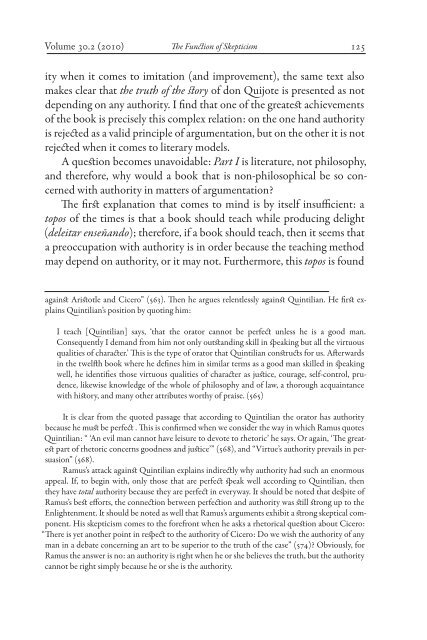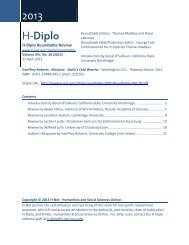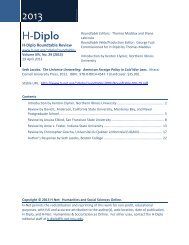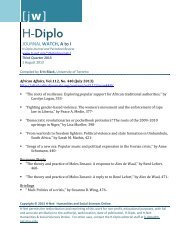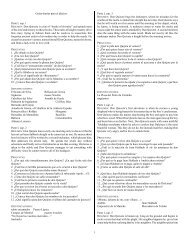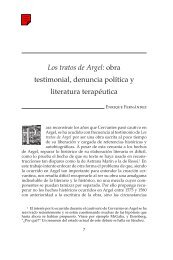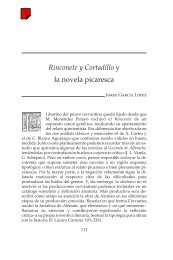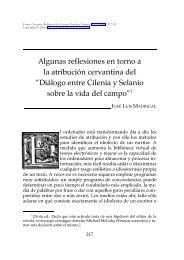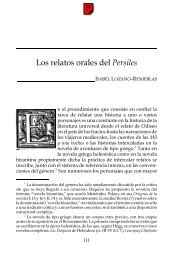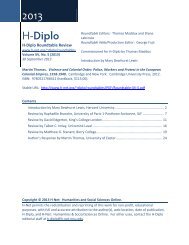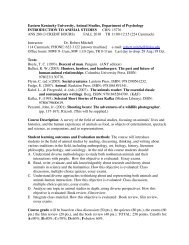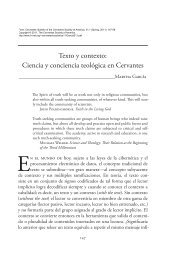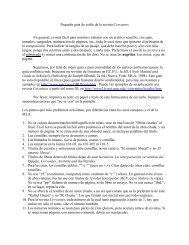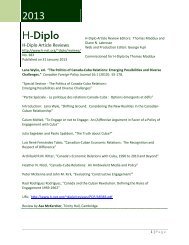The Function of Skepticism in Part I of Don Quijote - H-Net
The Function of Skepticism in Part I of Don Quijote - H-Net
The Function of Skepticism in Part I of Don Quijote - H-Net
You also want an ePaper? Increase the reach of your titles
YUMPU automatically turns print PDFs into web optimized ePapers that Google loves.
Volume 30.2 (2010) <strong>The</strong> <strong>Function</strong> <strong>of</strong> <strong>Skepticism</strong><br />
125<br />
ity when it comes to imitation (and improvement), the same text also<br />
makes clear that the truth <strong>of</strong> the story <strong>of</strong> don <strong>Quijote</strong> is presented as not<br />
depend<strong>in</strong>g on any authority. I f<strong>in</strong>d that one <strong>of</strong> the greatest achievements<br />
<strong>of</strong> the book is precisely this complex relation: on the one hand authority<br />
is rejected as a valid pr<strong>in</strong>ciple <strong>of</strong> argumentation, but on the other it is not<br />
rejected when it comes to literary models.<br />
A question becomes unavoidable: <strong>Part</strong> I is literature, not philosophy,<br />
and therefore, why would a book that is non-philosophical be so concerned<br />
with authority <strong>in</strong> matters <strong>of</strong> argumentation?<br />
<strong>The</strong> first explanation that comes to m<strong>in</strong>d is by itself <strong>in</strong>sufficient: a<br />
topos <strong>of</strong> the times is that a book should teach while produc<strong>in</strong>g delight<br />
(deleitar enseñando); therefore, if a book should teach, then it seems that<br />
a preoccupation with authority is <strong>in</strong> order because the teach<strong>in</strong>g method<br />
may depend on authority, or it may not. Furthermore, this topos is found<br />
aga<strong>in</strong>st Aristotle and Cicero” (563). <strong>The</strong>n he argues relentlessly aga<strong>in</strong>st Qu<strong>in</strong>tilian. He first expla<strong>in</strong>s<br />
Qu<strong>in</strong>tilian’s position by quot<strong>in</strong>g him:<br />
I teach [Qu<strong>in</strong>tilian] says, ‘that the orator cannot be perfect unless he is a good man.<br />
Consequently I demand from him not only outstand<strong>in</strong>g skill <strong>in</strong> speak<strong>in</strong>g but all the virtuous<br />
qualities <strong>of</strong> character.’ This is the type <strong>of</strong> orator that Qu<strong>in</strong>tilian constructs for us. Afterwards<br />
<strong>in</strong> the twelfth book where he def<strong>in</strong>es him <strong>in</strong> similar terms as a good man skilled <strong>in</strong> speak<strong>in</strong>g<br />
well, he identifies those virtuous qualities <strong>of</strong> character as justice, courage, self-control, prudence,<br />
likewise knowledge <strong>of</strong> the whole <strong>of</strong> philosophy and <strong>of</strong> law, a thorough acqua<strong>in</strong>tance<br />
with history, and many other attributes worthy <strong>of</strong> praise. (565)<br />
It is clear from the quoted passage that accord<strong>in</strong>g to Qu<strong>in</strong>tilian the orator has authority<br />
because he must be perfect . This is confirmed when we consider the way <strong>in</strong> which Ramus quotes<br />
Qu<strong>in</strong>tilian: “ ‘An evil man cannot have leisure to devote to rhetoric’ he says. Or aga<strong>in</strong>, ‘<strong>The</strong> greatest<br />
part <strong>of</strong> rhetoric concerns goodness and justice’” (568), and “Virtue’s authority prevails <strong>in</strong> persuasion”<br />
(568).<br />
Ramus’s attack aga<strong>in</strong>st Qu<strong>in</strong>tilian expla<strong>in</strong>s <strong>in</strong>directly why authority had such an enormous<br />
appeal. If, to beg<strong>in</strong> with, only those that are perfect speak well accord<strong>in</strong>g to Qu<strong>in</strong>tilian, then<br />
they have total authority because they are perfect <strong>in</strong> everyway. It should be noted that despite <strong>of</strong><br />
Ramus’s best efforts, the connection between perfection and authority was still strong up to the<br />
Enlightenment. It should be noted as well that Ramus’s arguments exhibit a strong skeptical component.<br />
His skepticism comes to the forefront when he asks a rhetorical question about Cicero:<br />
“<strong>The</strong>re is yet another po<strong>in</strong>t <strong>in</strong> respect to the authority <strong>of</strong> Cicero: Do we wish the authority <strong>of</strong> any<br />
man <strong>in</strong> a debate concern<strong>in</strong>g an art to be superior to the truth <strong>of</strong> the case” (574)? Obviously, for<br />
Ramus the answer is no: an authority is right when he or she believes the truth, but the authority<br />
cannot be right simply because he or she is the authority.


